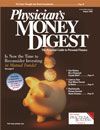Publication
Article
Physician's Money Digest
Spark Self-reflection out of a Shaky Trust
Author(s):
The roller-coaster stock market andcorporate scandals of the past fewyears have taken a heavy toll onone of the most precious commodities inthe financial-services industry: trust.
The latest sign of that toll was revealedin a study of affluent investors bySpectrem Group, a Chicago research firm.One quarter of those surveyed in fall 2004said declining trust prompted them totransfer at least some of their substantialassets to new financial providers. Giventhe time and hassle involved in switchingassets, particularly for the affluent, that'sa lot of movement. Many doctors are nodoubt having second thoughts abouttheir own financial advisors.
If you are thinking of making achange, you'll no doubt find reams ofadvice on how to conduct the search fora new advisor. However, you should takea deep breath and interview yourselffirst. Patients are best served through alasting connection with a medical professional,and they do themselves littlegood by jumping from doctor to doctorin search of treatment. Time that couldhave been devoted to resolving healthconcerns instead is spent breaking theice and taking medical histories. Thesame is true for your financial health.Trust is important because, as a busy professional,you rely on your advisor's judgmentto preserve your wealth and growyour assets. You'll want to think longand hard before making a change. Thefollowing are questions to ask yourself,before you do anything else:
•Am I upset with my advisor or withmy portfolio? You may not be gettingthe returns you wanted, or you may havelost money. If that's the main irritant inyour relationship, give your advisor achance to explain. If you're not satisfiedwith the answers, then by all means startlooking. But be careful that another advisorisn't promising more than they candeliver in today's volatile markets.
•Have I talked to my advisor recently?This happens more frequently in relationshipsthan we like to admit: We letour worries build up inside without talkingthem over. Your advisor deserves toknow what you're thinking. They alsodeserve a chance to set things right.
•Has my tolerance for risk diminished?You might not have as strong astomach for market swings as you didwhen you first started investing. A goodadvisor will rebalance your portfolio asyou age to ensure a comfortable retirement.But maybe you haven't been givingyour advisor any guidance. Now maybe the time to discuss what you are willingto tolerate.
•Do I distrust my advisor or thewhole financial arena? The news thesedays seems filled with reports of corporatemalfeasance, conflicts of interest,and outright fraud. It can be disheartening,particularly for new physician-investors.But don't let a few bad applestarnish the entire investment world.
You shouldn't be dissuaded fromswitching advisors if you feel it's necessary.But if you took care in picking yourcurrent advisor, you should take equalcare in firing them. You don't want tothrow away that relationship on an emotionalwhim without a good reason. Bytaking your own investment temperature,you'll avoid taking any rash steps,and perhaps you'll walk away withrenewed trust in your current advisor.
Richard M. Braverman is a
principal of Braverman Financial
Associates in Lancaster, Pa, a
registered broker/dealer and
member NASD and SIPC. Mr.
Braverman has more than 20
years of experience in the industry and welcomes
questions or comments at 717-399-4030 or
rich@bravermanfinancial.com.
